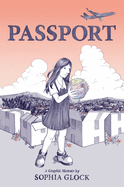
Few titles need official CIA permission to be published, but Sophia Glock's perceptive graphic novel memoir, Passport, had to go through the "daunting and complicated task" of obtaining the CIA's Publication Review Board approval. Glock's parents were "intelligence officers," an admission they disclosed when they deemed her mature enough to understand (although she might have already known). That revelation provided Glock a fuller understanding of a childhood defined by constant moving, endless questions and deflected answers.
"Sometimes I feel my life could be summed up in a series of collections," Glock muses. By 15, she's lived in nine apartments, worn seven uniforms and lived in six countries with three brothers, two parents and one sister. For now, the family (minus the two oldest at college) lives somewhere in Central America, protected by walls and twice-a-day security checks. Glock's parents experiment with sending her to a Spanish-only school, which doesn't quite work out. She's transferred to the "exclusive" American school where a stage play, first crush, ambivalent friendships, a classmate's suicide and family dramas all become part of her growing up.
Glock captures her adolescence in well-ordered panels shaded in violet, peach and occasional reds. To highlight emotional situations, Glock allows her speech bubbles to overflow panel borders. As emotions rise, the characters mimic the overflowing text and break the panels' rigid edges. Glock explains that "many details have been removed from the book" to earn the CIA's consent, but perhaps what might be imagined as missing reveals as much as what remains. Youth notwithstanding, Glock recognizes her unearned privilege amid a legacy of colonialism and U.S. domination. Despite possible elisions, Glock's memories resonate with vulnerable self-awareness and poignant charm. --Terry Hong, Smithsonian BookDragon

